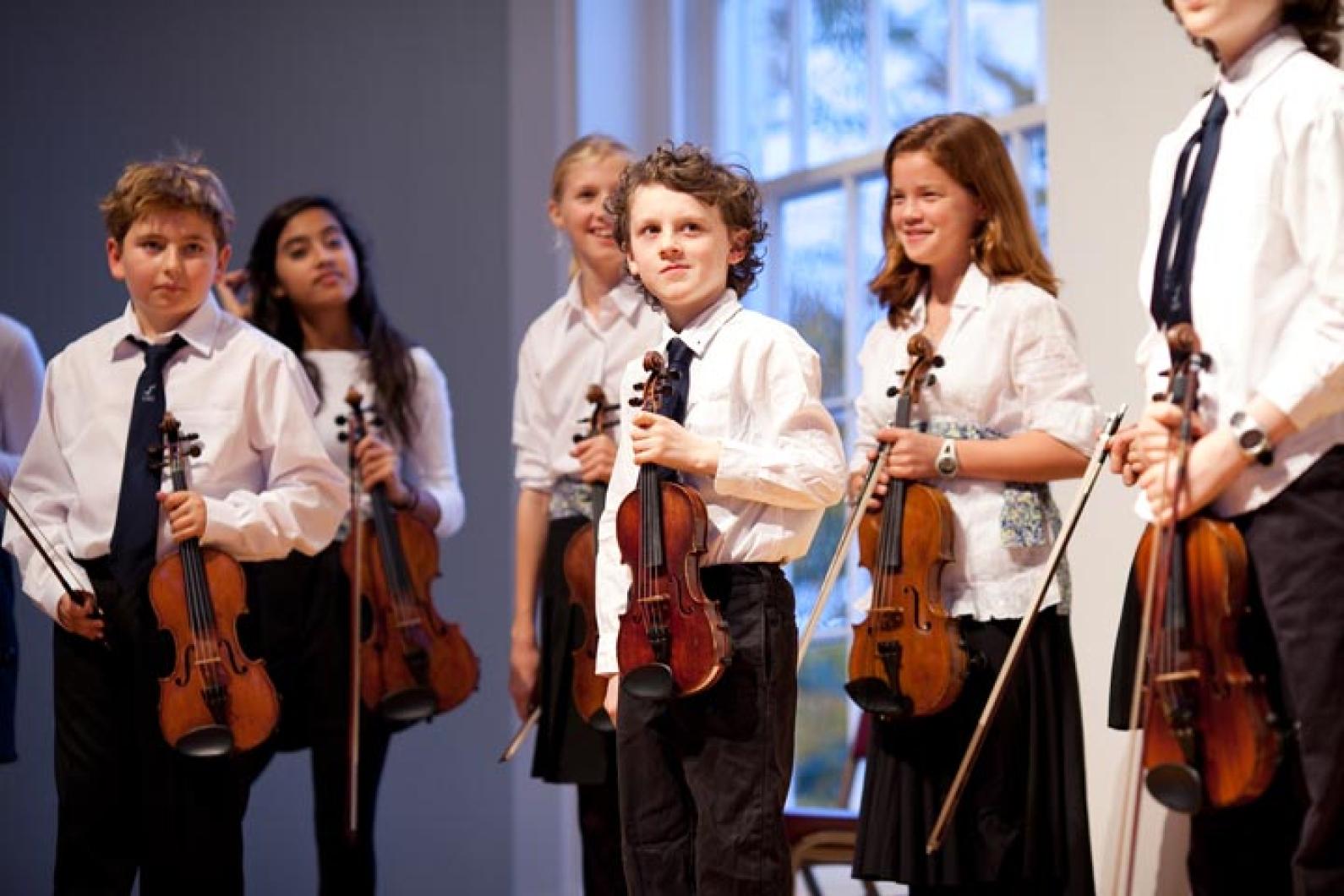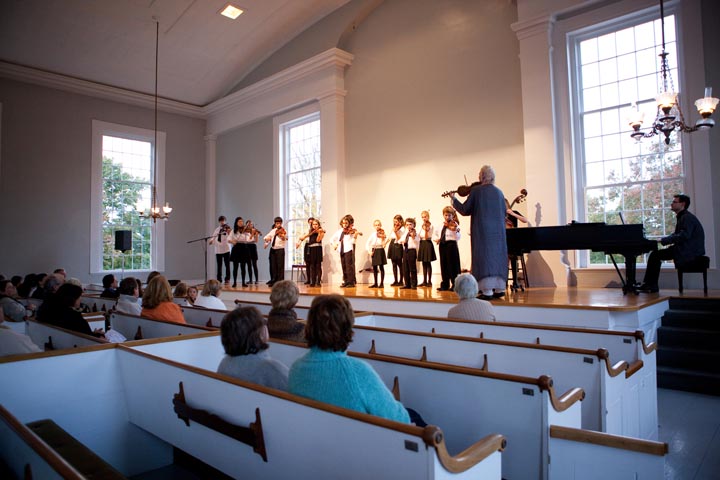Perhaps Helen Brunner’s life is just one endless series of inspirations, where everything is magical and amazing. One rather thinks, of course, that the Juilliard-educated mother of four who pioneered Suzuki training in England, simply sees her life that way. And her music students are at the center of it, whether those are Island children, to whom she offered a free (and magical) hour of personal instruction on Sunday, or her own grandchildren and others playing Vivaldi, Bach and other (amazing) pieces as the London Gold Group.
She glided across the stage as even the most tentative notes rang through the Old Whaling Church. “Oh, I like giving workshops at the Old Whaling Church,” she said, in her quintessentially plummy British accent, “Not a-tall like Notting Hill Primary School.”
A handful of Vineyard students had waited in the back of the church as the British 9 to 15-year-olds finished their impressive sound check. As the rich sound of the ensemble’s playing permeated the church, the Island children were undaunted. Likewise Ms. Brunner seemed as delighted to be with these Island students, in all their varying ability, as she clearly is with her string-zinging Notting Hill crowd.
She learned their names, tuned their instruments, had them all play Twinkle Twinkle Little Star and, with a little adjustment advice on the placement of their bodies and bows, suddenly the place was vibrating.
They played another Suzuki song, then each took a solo turn.
When a student was not playing quite in tune, she talked about the inner ear.
“I want you all to sing Happy Birthday in your head, without a sound,” she said, silently conducting the players and parents. “There, did you sing it? Did you hear it?
“Now where is that ear you heard it with?” she asked with her own twinkle.
Then the children played again, “singing” along in their head, with intonation perfectly improved.
When a child was not playing quite in time, she had the group moving around, walking or jigging as the piece demanded, and naturally the students’ rhythm pulsed properly and Ms. Brunner beamed.
“Helen is the master of crystallizing the elusive teaching point: why someone’s energetic performance isn’t energizing the audience; how someone can be playing in tune, but not compellingly in tune,” wrote a critic on violist.com. “She also manages to turn it into a positive experience that has even the most nervous student smiling widely by the end of their chat.”
A father chaperoning Ms. Brunner’s traveling minstrels noted, “She’s pretty tough.” But clearly she calibrates to her charges’ abilities. She seems to completely love what she does, and as her own teacher Shinichi Suzuki said, “If love is deep, much can be accomplished.”
Her London Gold ensemble began with Pachelbel’s Canon, taking the audience by surprise with their very accomplished playing. Then began a fury of solos — Cassius Bandeen opened with Bach’s Courante; the mop-topped, pocket-sized powerhouse Gabriel Rumney bounced through Bohm’s Perpetual Motion; a Vivaldi concerto by Ms. Brunner’s grandchildren, Joe Breadein, Ruby Brunner and Madeleine Brunner, was too good to hold the applause until the end as requested.
Saskia Guinness and the ensemble played Ave Maria with delicacy, a prelude to granddaughter Marnie Breadin’s soulful Adoration. Zoë Bruce led an assured trio in Vivaldi’s Spring. Twins simpatico on the strings, Esmé and Jonah Lyttle, played a Bach double seemingly effortlessly, before Devin Amsterdam rocked Potstock and Hinako Suzuki brought the place to perfect quiet with her moving interpretation of Weiniawski’s Legende.
The group decided, Ms. Brunner said, it would be fun to bring an American piece to America and so as a group they played Kansas City Kitty — complete with loose moves that complemented their largely formal classical concert.
After their final bow, the London Gold Group invited the Island students back on stage to perform a couple of Suzuki tunes, and they all played as one, with their teacher radiant.
Whether experienced in Edgartown or in London, “Art is not in some far-off place,” as Dr. Suzuki said. And the young musicians on stage served to illustrate the rest of his quote: “Art is the expression of a man’s whole personality, sensibility and ability.” Under Helen Brunner’s generous tutelage, that expression was simply a series of inspirations.








Comments
Comment policy »